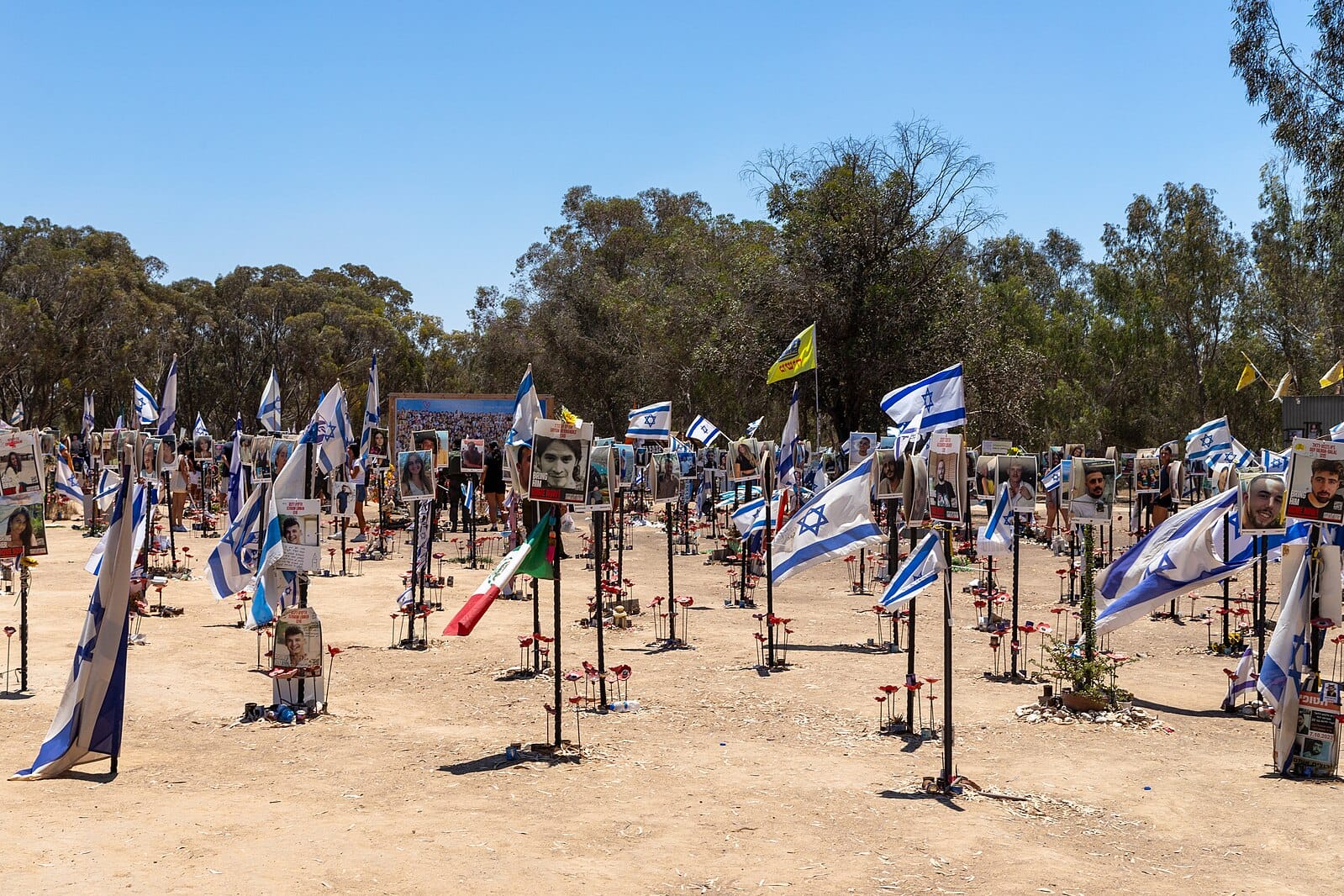The impossibility of Israeli grief
Zionism has long made an enemy of mourning, preventing Israeli society from sitting with loss before it is once again time to take aim and kill.

Following the return of the Bibas children’s remains in February as part of the Israel-Hamas ceasefire, Israelis lined the streets to do something hardly seen in public since October 7, 2023: grieve.
It was a short-lived moment. Just weeks later, Israeli forces would shatter the Gaza ceasefire with what has been called “the largest child massacre” in Israeli history – killing two hundred children in just one day, and with them a similar number of adults.
Apart from being a crime against humanity, the whiplash-inducing pivot highlights a deep darkness within Israeli society: an incapacity to mourn. Shock and loss are instantly transformed into anger and vengeance, leaving no space to contend with the grief itself. In the days following October 7, this transformation was exemplified vividly by stories of Israelis who had lost loved ones in the attack abandoning their shiva – Judaism’s week of ritual mourning – to voluntarily join the army’s destruction of the Gaza Strip. Turning grief into deadly violence, their onslaught continues to deny Palestinians their lives, and their grief, too.
Far from being the effect of a state-led campaign, the transmogrification of Israeli grief into violence seems to happen on its own, proceeding inexorably within each citizen’s soul. As Palestinian scholar Abdeljawad Omar puts it, “Israelis need to learn to mourn.” Indeed, even those of us opposed to the militarised paradigm of retribution have struggled to express our grief, as though our feelings might betray our politics and become fuel for genocide.
Roots of domination
The roots of this transformation process run deep, through to the very foundations of Israeli statehood. Unable to quite rid the country of its indigenous population, but unable also to assimilate it fully into a state whose raison d’etre is to make a modern nation out of Others — out of Jews — the State of Israel has always relied on one real tool for its dealings with Palestinians: violence. This violence is not always employed in its brute physical form, but even where espionage, blackmail or psychological warfare are used, bodily harm always lurks at the ready. In present and past peace talks, Israeli negotiators’ main bargaining chip continues to be not so much a carrot as a withholding of the stick; in Gaza, they have continually offered little more than a temporary cessation of hostilities in return for their far-reaching demands.
The core dynamic of the Israeli-Palestinian relationship, then, follows a crude playbook: Israel tries to violently crush the Palestinians’ resolve, and when it inevitably resurfaces, the collective Israeli reaction is to double down even further. “What doesn’t work by force, works with more force,” as the Israeli idiom has it. The minority in Israel opposed to this barbaric formula has consistently been overruled, precluding any transition to a less violent paradigm. Indeed it is a formula that applies the same, regardless of the form that Palestinian resistance takes – whether the non-violent general strikes and mass protests at the start of the First Intifada in 1987, or the shocking violence of armed incursion and massacre of October 7.
The grief of heroes
The transformation of grief into retribution has long facilitated a violent response from Israel, predating even the founding of the state. As historian Gabriel Winant puts it, the ideology of Zionism itself is “a machine for the conversion of grief into power”. With this machine’s success in seizing that power in 1948, on the heels of the Holocaust, long and painful histories of Jewish suffering became rationale for glorifying military power and victimising others.
Nowhere is this more apparent than during the spring, when Israel’s national calendar drums a perfectly-sequenced Zionist narrative of mytho-historical persecution and contemporary grief into Israeli bodies and souls. Holocaust Memorial Day is followed a week later by another memorial day for fallen soldiers – itself promptly followed 24 hours later by Independence Day. Having observed a minute of silence in the morning, Israelis transition into partying at night (and hitting each other with squeaky plastic mallets, as is the tradition).
Meanwhile, ancient Jewish holidays like Hanukkah, Purim, and Passover are given a Zionist twist, reinforcing the same messaging year-round: we once were victims, but now we are free. Any grief we incur now is the grief of heroes, the price we pay for our sweet independence.
Domination at all costs
There is at least one revealing exception to this pattern of myth-making, a category of Israeli military losses that are hardly acknowledged, let alone commemorated: suicides. Even after all that indoctrination, every year about a dozen young people conscripted into Israel’s army leave it in quiet desperation by means of their service weapon. Since October 7, that number has more than doubled. But the pain left behind by these deaths has no use for the state, and can play no role in justifying further violence. Grief for these soldiers cannot be collectivised, and so it is hardly given the light of day.
This, then, is the hidden face of Israel’s mourning regime: while grief which can be used to legitimise lethal domination is consecrated and ritualised, any grief which might undermine the status quo is sidelined, suppressed, ignored.
Against this backdrop, the state’s contradictory attitude towards Israelis taken captive on October 7 begins to make sense. On the one hand, the Israeli government has wielded the pain of the captives and their families domestically and internationally to drum up support for, and justify, the continued annihilation of Gaza.
But on the other hand, that onslaught has been conducted at the expense of those same captives’ lives: much as Finance Minister Bezalel Smotrich demanded on October 8, 2023, the military has disregarded the hostages’ lives, and the wishes of their families, in order to “hit Hamas brutally.” Indeed, since the ceasefire, newly freed captives and their families have pleaded urgently for the government not to resume its bombardments, which have taken captives’ lives before and threaten those that still survive.
But the Israeli government continues to wield its one move to the greatest extreme: meting out extreme violence to the point of extermination. Well-trained at channeling shock, grief, and trauma into deadly force, Israeli society has largely lined up to support it.
Our failure to mourn
In the time since October 7, Jewish Israelis and foreign sympathisers have never ceased to publicly castigate the world for failing to mourn our losses. Some highlight the first two days of fighting, when Israeli troops had not yet entered the Gaza Strip and Defense Minister Yoav Gallant had not yet declared the “complete siege” for which he now stands accused of genocide. Viewing the global response to Israeli suffering during those two days as insufficient, Zionist bodies such as the World Jewish Congress quickly found confirmation of the world’s ancient, ineradicable hatred of Jewish people.
But these accusations are sorely misplaced – as the failure to mourn comes from our own society first, from its reflex to seek revenge. From the very first news of Hamas’s incursion, there was no doubt that Israel’s response would be violent beyond all proportion. This is not only demonstrated by the government’s established track record, but also declared in established military doctrine, and continuously reinforced by political rhetoric. If people of conscience were hesitant to engage with Israeli pain, it is not because they deny us our common humanity, but because they sensed that our pain was predestined to slip into visiting death upon others. Our grief was condemned from the very beginning, doomed to drown in blood.
And still, as both Jewish and Islamic tradition have it, each human life is as precious as the entire world. Every life lost to the death spiral of Zionist domination is one too many. Every life on earth deserves to be grieved, and every mourner deserves the space to grieve. To make that space, we must first dismantle the violent machines that have long filled it.▼
Michael Sappir is a multilingual writer and organiser from the Israeli left, formerly active in Tel Aviv and in Germany, currently based in Chicago, and a founding editor of the bilingual Berlin magazine The Diasporist.
Author

Michael Sappir is a leftist writer and organiser from Israel, based in Berlin.
Sign up for The Pickle and New, From Vashti.
Stay up to date with Vashti.



